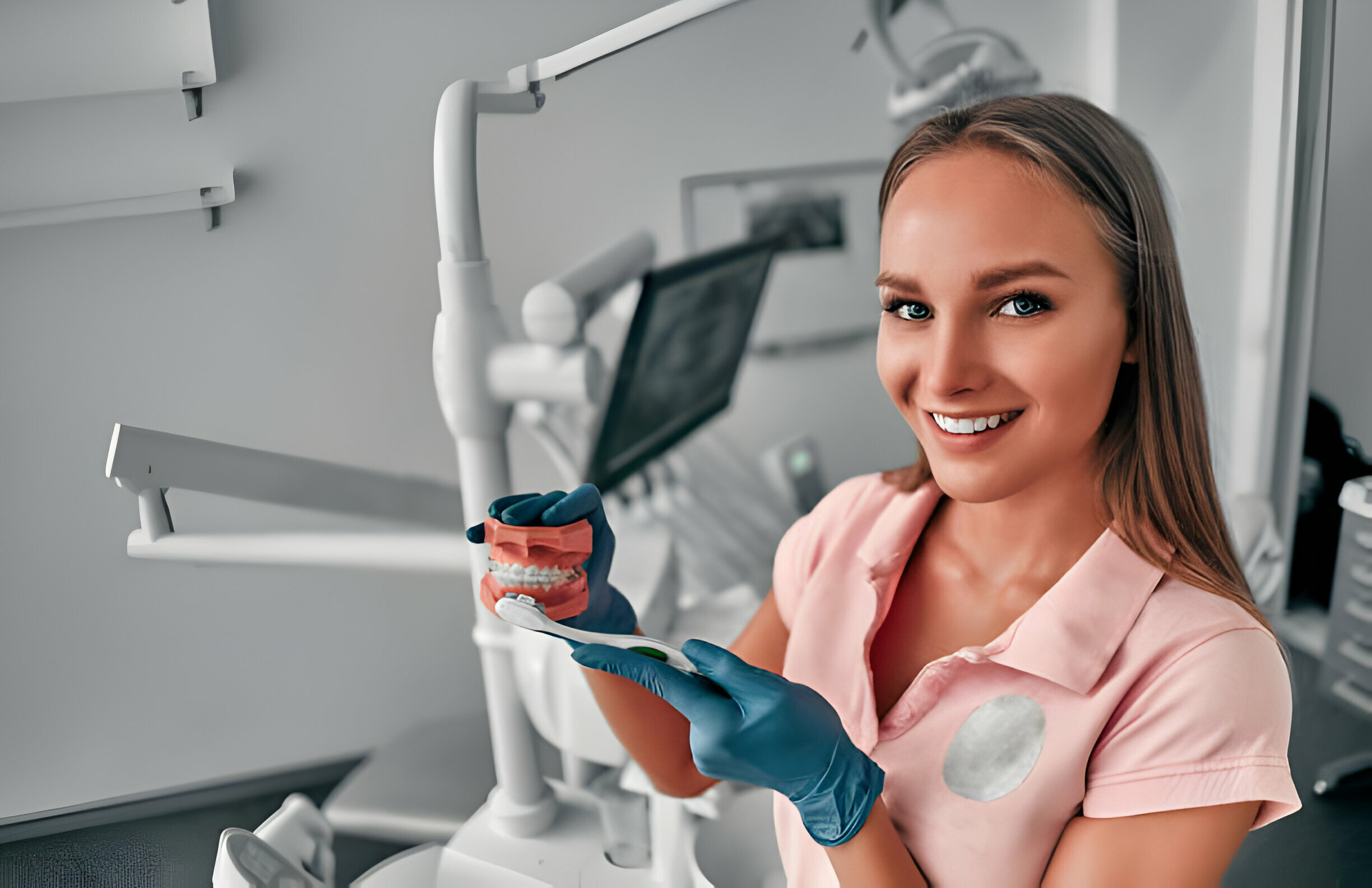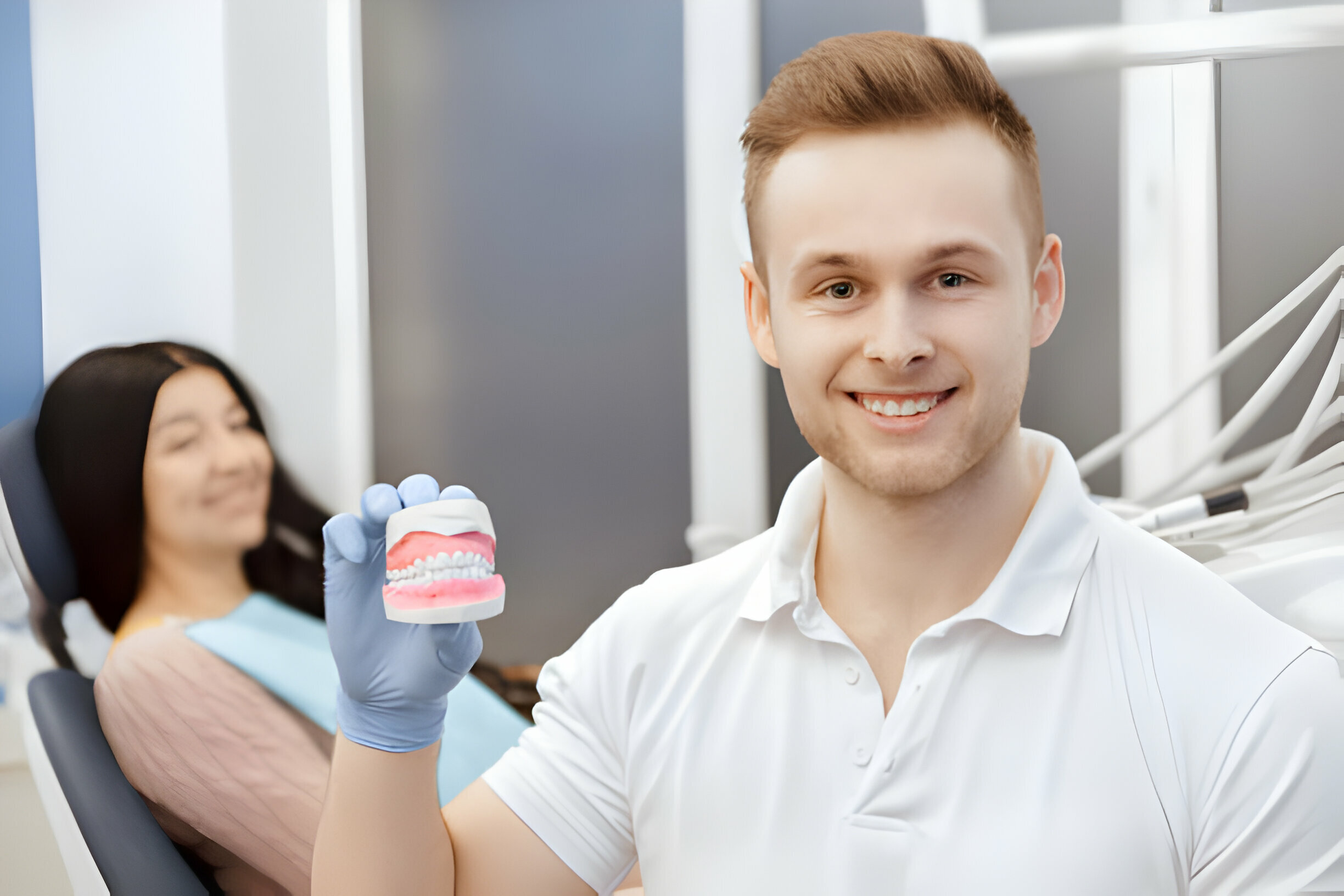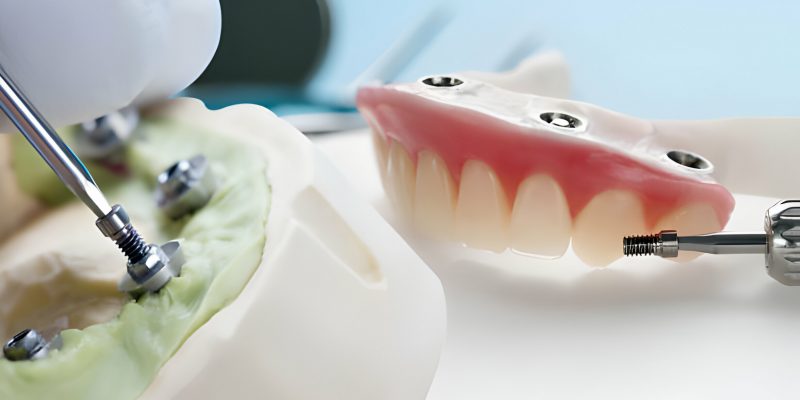Summary:
Partial or complete dentures are an effective solution for over 178 million Americans.
They’re the perfect appliance to restore your smile, especially if you’ve lost one or more teeth from your cavity. Dentures, by design, are removable replacements for one or a few missing teeth.

In this blog, we take a closer look at:
- Dentures – The Perfect Solution to Make Up for Lost Teeth
- The Different Types of Dentures – How Are They Fitted?
- Adjusting With Your Appliance – The Phase in Detail
- Food Restrictions With Your Appliance – What You Can and Can’t Eat with Dentures
- Tips to Properly Clean Your Dentures
Continue reading as we learn more about teeth dentures in the following sections.
Dentures – The Perfect Solution to Make Up for Lost Teeth
Dentures are prosthetic teeth designed to replace lost natural teeth. The amount of lost teeth determines whether you receive partial or total false teeth.
- Partial dentures replace a few teeth from either jaw.
- Complete denture options replace all teeth.
You must consult a gum expert if your gums and surrounding tissues are not in good health. These appliances are designed to replace lost teeth, support your face muscles, and improve your smile.
These appliances also help you chew, consume, and speak properly. They help prevent jawbone resorption by restoring chewing function.
Are You a Good Candidate for Dentures?
Anyone who has one or more missing teeth is a suitable candidate for dentures. A patient must have healthy gum tissues and sufficient jawbone structure to support the appliance effectively. Different dentures are ideal for patients of all ages; however, they are most commonly associated with those over 65.
There are several reasons why the majority of individuals have missing teeth. This includes:
- Natural aging
- Severe tooth decay
- Periodontal disease
- Poor oral hygiene and health
- Tooth extraction
- Jaw or facial injury
The Different Types of Dentures – How Are They Fitted?
Different types of dentures are available on the market based on your oral health and specific condition. The most common types include:
-
Complete:
These replace an entire arch of teeth, whether in the upper or lower jaw. They comprise a complete set of prosthetic teeth linked to an acrylic foundation the same color as your gums.
-
Partial:
These are utilized when only a few teeth are lost. Partial dentures are made out of artificial teeth affixed to an acrylic or metal framework that fits around your natural teeth and helps to bridge gaps.

-
Hybrid:
These dentures are attached to dental implants, which provide further stability and support. They may be used for full and partial appliances and are frequently advised for people seeking a more secure fit.
-
Overdentures:
These are intended to fit over oral implants or existing teeth, adding further support and stability to the cavity. Overdentures can also assist in protecting the remaining natural teeth and jawbone structure.
Different Stages of Fitting Oral Appliances
Stage I – Installing dentures is a common operation. The first step toward receiving the appliance is to attend a dental clinic for a professional examination and consultation.
Stage II – The dentist will examine your remaining bones, teeth, gums, and overall health. Your West Columbia dentist will schedule your fitting appointment if you are eligible for the procedure.
Stage III – During your initial appointment, your dentist will clean your mouth and take molds of your natural gums and teeth. Digital photographs can also be captured and transmitted to the dental lab and molds to build personalized dentures. The dentist will advise you on the appliance’s color, size, and shape.
Stage IV – When your appliance is ready, the best denture dentist will ask you to visit their office for the fitting procedure. Once there, these professionals will check them for appropriate fit and make any necessary changes.
Your expert will fit the appliance once everything is set and in order. However, your dentist will first educate you on the basics of using the appliance for removable dentures.
Adjusting With Your Appliance – The Phase in Detail
The denture process starts with an adjustment period, which varies from person to person. It is typical to feel discomfort, have difficulties speaking, and have feeding problems in the first several weeks.
However, most people get more comfortable with their false teeth within a month or two. Wearing your appliance as often as possible during the initial adjustment phase is critical because it allows your mouth to adapt to the new equipment.

Your dentist may advise you to start with shorter wear durations and progressively increase the time until you can wear your false teeth comfortably all day.
Dentists suggest removing your appliance at night to relax your gums and jawbone. However, they may also recommend that you wear your false teeth overnight for the first few days to identify any areas of pain that may require modification.
After they are fitted and finalized, your dentist for dentures in Columbia, SC, will discuss the best way for you to adjust to them.
Food Restrictions With Your Appliance – What You Can and Can’t Eat with Dentures
One of the most prevalent worries for those new to Carolina dentures is knowing what they can and cannot eat. While dentures need certain dietary changes, you’ll discover that you can still enjoy many of your favorite meals.
Eat soft foods such as mashed potatoes, yogurt, and applesauce to get used to your false teeth. As you are comfortable with your diet, you may gradually include more solid meals.
Some food items to avoid or approach with caution include:
- Sticky or chewy foods may dislodge your dentures.
- Hard or crunchy meals may cause your dentures to crack or shatter.
- Foods with microscopic seeds or particles might become caught under your dentures, causing pain.
Remember to chop your meal into little pieces and chew slowly with both sides of your mouth. It will assist in uniformly distributing pressure and reduce the danger of dislodging your appliance.
Tips to Properly Clean Your Dentures
Proper care is vital for keeping your dentures looking good and lasting longer. How to clean your dentures:
- Take your appliances out of your mouth and rinse them under running water to eliminate any loose particles.
- Brush your false teeth gently with a soft toothbrush and a non-abrasive cleaner. Avoid using ordinary toothpaste, which might be excessively abrasive and harm your appliance.
- Soak your appliance overnight in a false teeth cleaning solution to help eliminate any leftover dirt and bacteria.
- Rinse your appliance again before inserting it back into your mouth.
Takeaway
- Oral dentures are a great way to restore your smile if you’ve lost one or a few teeth.
- The denture procedure begins with an adjustment phase, which varies according to the individual.
- Dentures are life-saving! Learn more about the appliance with our experts Carolina Smiles Family Dentistry.

